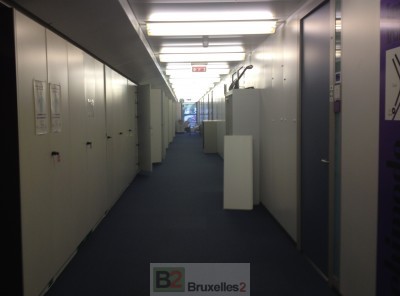Fight against terrorism. Do not hurry!

(BRUSSELS2) Faced with the resurgence of a new terrorist threat (1), the European institutions have, for the moment, shown a certain "prudence" (let's be nice) in the way they consider both the threat and the measures to take. But the threat is not cyclical or confined to a single country (France), the operations carried out by the Belgian police on Thursday (2), and the German police on Friday prove it. Spain, too, would be concerned. A man who may have had a link with the Coulibaly-Kouachi network was arrested in Bulgaria, Etc. It concerns all of Europe.
A certain wait-and-see attitude
The wait-and-see attitude was particularly marked on the side of the EU presidency – held today by Latvia – which seemed totally outdated like the European Commission.
An outdated EU presidency
No emergency meeting of EU interior ministers has been called, despite announcements made at Sunday's G10 meeting in Paris. As for the meeting of COSI, the committee bringing together the directors of internal security from the 28 member states, scheduled for January 20, it was only called very late. A delay in the ignition of the Latvian presidency of the EU, already pointed to B2 (Read: Terrorism. A hesitant Latvian EU presidency and sidelined itself). Several European diplomats and experts have confirmed this to me. Latvians seem Super-Parents by events, a senior European diplomat confirmed to me. The Latvian approach is quite " rigid » and is reluctant to « shake up your agenda and priorities another told me.
The Commission's DNA is reluctant to act urgently
The European Commission is reluctant to present urgent measures (it's not really in its DNA!). Home Affairs Commissioner Dimitris Avromopoulos “debriefed” his colleagues on the situation in Paris, in the words of his spokesperson. Nothing more. And a little light! The European executive prefers to take refuge in what has already been done (chemical precursors, radicalization network, etc.) and says it does not want to decide urgently (Read also: Faced with terrorism, Frans Timmermans tempers. We'll talk about it again in May!). Intention certainly commendable (on paper) but totally incomprehensible in political reality.
The illusion of calm and serenity
Do not act under duress: a decoy
The Commission risks being overtaken by reality very quickly. It is enough that there is an attack or two more in one or more European countries so that the European institutions (as national) are placed under an additional constraint. And the "panic" effect will then be all the more sensitive as the indecision will have preceded.
Objective of the terrorists: strike "small" blows several times
If the "GIA" (*) tactic - used in the years 1994-1995 - is repeated by the "terrorists", one can expect such an attack every 3-6 weeks to maintain the pressure. Attacks that are all in all quite limited, in view of certain attacks that have occurred in the past in Europe. The bomb attacks in Madrid in March 2004 killed nearly 200 people and injured more than 1000! But attacks that make a significant impact on the targeted targets, in media and political terms. The underlying objective of these attacks is to divide the population and hold it up to find scapegoats (Muslims or Jews, or even both).
A diffuse threat to many countries
All European countries are a possible target. The Netherlands is a country particularly sensitive to the threat, like all those which have many "European" combatants who have gone to Syria or Iraq (United Kingdom, Sweden, Belgium, Germany, etc.) or are engaged in the anti-Daesh coalition in Iraq, even ISAF in Afghanistan. The countries in Eastern Europe which consider themselves to be little concerned, could also be targeted in the long term, having largely committed themselves to the ISAF operation.
A European inflection
This series of attacks (in Paris) and threats in several European countries shows that there is a political shift not only at the security level, but also judicial, economic and social. There is a series of reflections, before decisions, to be carried out. And these reflections must be initiated, as soon as possible and at the highest level, not only in groups of experts, but at the highest political level.
Some European shipyards
There are multiple European shipyards. Several have already been outlined: the establishment of a European PNR, the modification of the Schengen system, internet surveillance, anti-radicalization networks (Read: What can Europe do in the face of terrorism? Improve the legislative system?). Let us focus on a few
Change the Schengen code becomes an imperative. The watchword at the Commission is: each State can carry out non-systematic checks, based on objective criteria”. It's true. But, as most terrorism experts point out, notably the European coordinator G. De Kerchove, this is not enough. In fact, there seems to be a catch, according to specialists. Checking certain people on the basis of racial background or geographical origin will not slip through the cracks of an anti-discrimination check. And the risk is great of seeing the justice then cancel the procedure.
Information exchange. It is the panacea and what is missing, to hear the politicians. Listening to the specialists, in fact, the exchange of information is done, over the counter, and in an operational way. What is missing, however, is a legal framework.
The legal framework. The definition of terrorism in the European decision is imperfect. It does not take into account the notion of European combatants. A precision which is not theoretical: it makes it possible to harmonize the procedures at the European level and serves as a basis for other devices (such as the arrest warrant). Similarly, some tools are missing in the fight against funding. This does not automatically take into account the fact of having low amounts (we are in a logic of the fight against crime which tracks large movements).
European institutions. It's a bit of a mess, to be honest. Everyone does a little bit of everything. Responsibilities are scattered, poorly coordinated. There is a lot of energy loss. One coordinates the political response, without having the means. The other has control of finances and legislative initiative, but is reluctant to use them. The analytical instruments are at the European diplomatic service. There is also Europol and Eurojust, which have more of a consultation function between national structures rather than an operational tool. Etc. The whole seems rather uncoordinated and of a very vague logic.
Longer term thinking. A reorganization, with a clearer definition of skills, as well as a longer-term reflection, seems urgent. Would setting up the equivalent of a "European Security Council" bringing together the various managers of the services concerned (DG Home, IntCen, Europol, etc.) be useful? Or would giving the counter-terrorism coordinator the possibility of introducing initiatives (if the Commission is reluctant to do so) would be necessary?
(Nicolas Gros-Verheyde)
(1) Contrary to what some say: if the threat today takes new forms, the threat and terrorist action are not new in Europe. Without going back to the Red Brigades, Direct Action and far-right attacks, which had another political logic and another modus operandi, the two waves of attacks that France experienced in 1986 and 1994-95 are not so far from us.
(2) Read:

